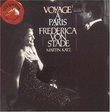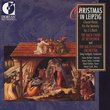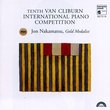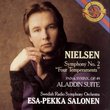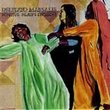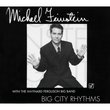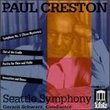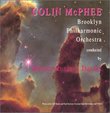| All Artists: Charles Tomlinson Griffes, Denver Oldham Title: Griffes: Collected Works for Piano Members Wishing: 0 Total Copies: 0 Label: New World Records Release Date: 8/19/1997 Genres: Dance & Electronic, Classical Styles: Chamber Music, Forms & Genres, Short Forms, Sonatas, Suites, Historical Periods, Classical (c.1770-1830), Modern, 20th, & 21st Century Number of Discs: 1 SwapaCD Credits: 1 UPC: 093228031024 |
Search - Charles Tomlinson Griffes, Denver Oldham :: Griffes: Collected Works for Piano
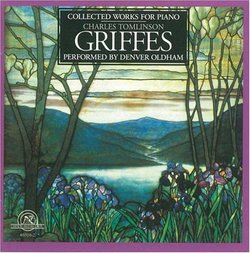 | Charles Tomlinson Griffes, Denver Oldham Griffes: Collected Works for Piano Genres: Dance & Electronic, Classical
Pillow - Roll (Scribbles) |
Larger Image |
CD DetailsSynopsis
Product Description Pillow - Roll (Scribbles) Similar CDsSimilarly Requested CDs
|
CD ReviewsQuite a surprise! Todd Ebert | Long Beach California | 09/18/2003 (5 out of 5 stars) "The work of Charles Griffes may represent one of those rare hidden treasures of America's not-too-distant past. Although his piano works draw upon the likes of Debussy and Chopin, they certainly seem unique and creative enough to warrant similar acclaim. In his music I hear a certain introspective sound that I suppose one would call "impressionism". Anyone who can appreciate Debussy's work, or even Bill Evans's for that matter, will definitely want to check out this cd. The artistry and sound quality also seem quite exceptional." A convenient collection of Griffes piano works, unfortunatel Discophage | France | 11/19/2007 (2 out of 5 stars) "Sometimes I feel that Charles Tomlinson Griffes owes his relative neglect to the fact that he was American, rather than French or Russian. The fact that he died in 1920 at the untimely age of 35 didn't help either, of course. Not that the music is entirely and uniquely personal: on the contrary: though Griffes expressed, in a letter from 1911 quoted in the liner notes, his "deadly fear" of sounding like an imitator, cycles like the "Three Tone Pictures" Op. 5 (1910-12) or "Roman Sketches" Op. 7 (1915-1916) appear strongly indebted to Debussy, Ravel and Scriabin. But Griffes is not inferior to these models, and the compositions are highly ejoyable examples of musical impressionism. There are many traits in his masterful Piano Sonata (1917-8) that evoke Bloch's own Piano Sonata or the Swiss/American composer's Visions and Prophecies - the pounding anger, the stark and massive chordal blocks, the sensual and vaguely oriental melodic turns, the terse, Franckian chorale of the middle section - and Bloch's works were written more than fifteen years later. Griffes was a composer who kept abreast of the most advanced music of his days - other than the composers mentioned above he was, re the notes, familiar with new scores by Stravinsky, Schoenbeg, Busoni, Milhaud, Varèse, Ornstein. One is left to muse at how his language would have developped had he lived twice as long as he did.
So it is good in principle to have large chunk of his piano output collated on this well-filled (near 67 minutes) disc, including his major pieces, the Sonata and the two big cycles mentioned above. The recordings were made between 1977 and 1981 and were first published as a New World 2 LP set (310/11) in early 1983. These were Denver Oldham's debut recordings as well. It was an important milestone in the rediscovery of Griffes, as it resulted from thorough research made by the scholar Edward Maisel, and featured unpublished pieces, all present on this reissue. Left out on the CD are the three Fantasy Pieces Op. 6 (Barcarolle, Notturno and Scherzo - but they are more traditionaly Romantic than the Op. 5 and Op. 7), and the composer-played piano-roll of "The White Peacock" which came on the LPs as a nice bonus. On the CD the works are presented not according to the folio grouping or batch sequence in which they were published, but to the chronology of their composition - an entirely acceptable option. The liner notes - by Edward Maisel himself - are a treasure-trove of detailed information. All this would be great, except for two drawbacks. One is minor: the sound is clear, vivid, but some of the tracks have noticeable tape-hiss and the Sonata sounds more muffled than the rest. More detrimental is the fact that Oldham's "objective", uninflected readings are not satisfactory. Sometimes the approach does yield good results, for instance in the 3rd prelude, where Oldham's objectivity gives the piece a whimsical character - a valid alternative to James Tocco's dreaminess (in volume 1 of his four volume traversal of the piano music of Griffes and piano sonatas of MacDowell for Gasparo: MacDowell: Griffes, Vol. I). Oldham's fastish tempos can also have a certain impact in the more passionate moments of "The White Peacock", "Nightfall" or the Sonata. The deliberate and clock-steady ostinato of "The Lake at Evening" is quite effective, more so than James Tocco's more animated tempo (MacDowell & Griffes, Vol. 4). His pedalling in the 2nd prelude allows for atmospheric resonances to come out. But in general Oldham sounds perfunctory, uninvolved and unatmospheric. His "White Peocock" has little of the Scriabinian languidity found with Feinberg (The American Innovator) or Shields (Piano Music In America 1900-1945). His "Night Winds" are not particularly agitated or anxiety-ridden. He is not very varied in his colors in "The Vale of Dreams" and doesn't bring out as much as they deserve some of the left-hand counter-melodies. His swiftly drifting "Clouds" have overall little atmosphere (although in some sections the approach is more effective than Tocco's) and again he misses some left-hand accents. There are some wonderfully atmospheric moments in his "Nightfall" but he misses the Sarabande lilt of the ternary time signature at 0:56 and lets some left-hand counter-melodies pass unnoticed. His pedestrian approach entirely misses the fiery passion of the first Prelude, as well as the exquisite charm of Legend - a waltz in bitter-sweet harmonies. In the Sonata's first section, though his tempos are very similar to Tocco's (MacDowell & Griffes, Vol. 3), he appears metronomic and uninflected, just going through the motions and simply not up to the music's fiery passion; in the "molto tranquillo" section starting at 6:46 he appears inexpressive, where Tocco makes it a moving religious meditation ; as for Oldham's finale (10:43), it simply plods, and he makes the fugato sound like an academic exercice rather than, like Tocco, a harbinger of Prokofiev's 7th Sonata. I am sorry for this harsh comment, but oftentimes Oldham's reading struck me as an object lesson in un-musicality. It is not a fair representation of the masterful Piano Sonata. Tocco's Griffes has the obvious disadvantage of coming on 4 volumes, each being disappointingly short (all under the 45-minute mark). The sonics are also somewhat dry. But interpretively, Oldham is simply no match. Too bad, but this is a lost opportunity. " |

 Track Listings (17) - Disc #1
Track Listings (17) - Disc #1
